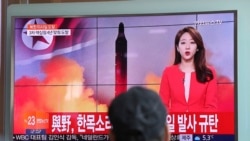After two nuclear tests and multiple missile launches in 2016, North Korean leader Kim Jong Un tested a new intermediate-range missile Sunday. The rocket flew about 500 kilometers before splashing down in international waters between South Korea and Japan. The missile is believed to have used solid fuel, a type that would make future launches more difficult to detect.
The United Nations Security Council met Monday at the request of South Korea, Japan and the United States. The 15-member council unanimously condemned the launch.
North Korea rejected the U.N.’s statement, saying the test was defensive in nature. So will the Security Council’s latest rebuke make a difference in how North Korea behaves?
“The North Koreans are very afraid of imposed regime change by the United States or [an] outside power,” says Harry Kazianis, director of defense studies at the Center for the National Interest.
“They are extremely afraid that the United States someday will make the determination, [as in] the case in Iraq or Afghanistan or Libya, that it is time to impose some sort of regime change. So this is why you could have all the U.N. Security Council resolutions that you want, you can have toughest language that you want. … Quite frankly, it’s not going to work,” Kazianis said.
Jonathan Miller, senior fellow for the China, East Asia and United States program at the EastWest Institute, agreed. “Within the past six years or so, the North has conducted so many missile tests and nuclear tests with little to no change to their strategic calculus," he noted, that "this kind of statement from the U.N. Security Council, while welcomed, I don’t think it will fundamentally change the course for Pyongyang.”
Is international pressure sufficient?
A goal of the international community has been to create an environment where North Korea decides to denuclearize, but is there adequate international pressure for Kim Jong Un to abandon his goal of building a nuclear arsenal?
Kazianis does not see a “scenario where North Korea gives up its nuclear weapons program.” While countries like the United States, South Korea, and Japan outman and outgun North Korea, he says, “the only thing that brings sort of an equalizer to the situation is North Korea’s, quite frankly, crude nuclear weapons program.”
Miller says while North Korea may not abandon its goals in the foreseeable future, there are other unknowns.
“I think the wild card here is how the Trump administration will approach the North. I really don’t believe they really have that figured out yet. You can kind of clearly see that the U.S. fully articulated its thoughts on how it will approach North Korea, having [Japanese Prime Minister Shinzo] Abe speak first and the president in the background just echoing those thoughts,” Miller said, referring to an impromptu news conference by the two leaders in Florida after news broke about Pyongyang's missile launch.
What's price of abandoning nuclear work?
“I don’t know that the North is in a position where they feel they can barter their program for almost anything,” Miller said. "It’s become that ingrained into the policy and to the legitimacy of that regime. ... It becomes very difficult to move toward that road of denuclearization.”
If North Korea won’t abandon its programs, how should the international community respond?
Kazianis says there are two things the international community should do. First, he says, is to further isolate and limit North Korea’s nuclear and missile capabilities. This can be accomplished with the United States’ Terminal High Altitude Area Defense missile system (THAAD), but also with additional defenses in Japan.
The second item Kazianis suggests is talking to North Korea. “We don’t want to get into a situation where we have these endless cycles of North Korean missile testing ... because eventually one of these tests could go wrong, and it could cost people’s lives, and that’s how wars start,” the analyst added.







